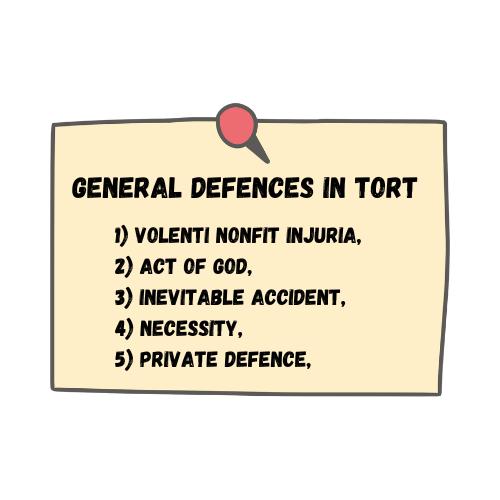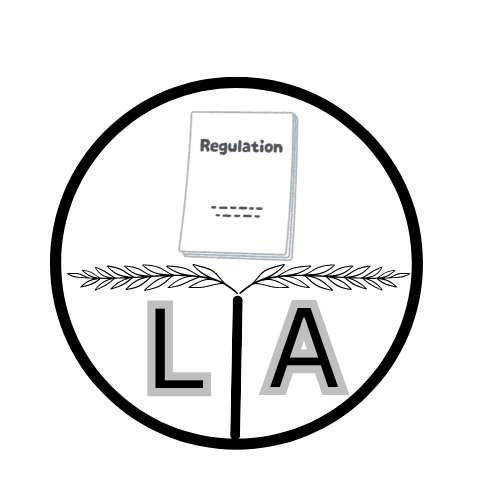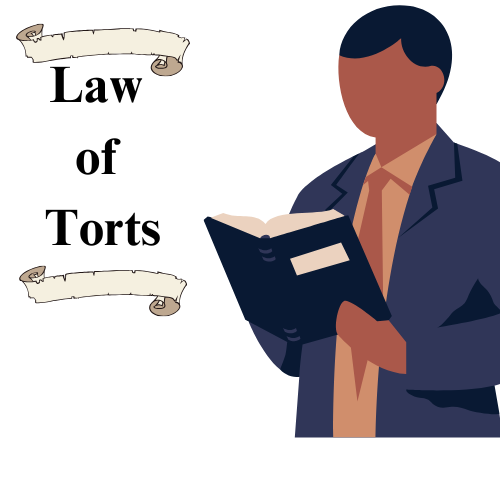General defences under Law of torts
General defences under Law of torts
General defences under Law of torts
General defences under Law of tortsGeneral defences under Law of torts

General defences under Law of torts
This notes is prepared by the Law professionals for easy understanding and learning for the students. These notes are in easy language and easy to remember.
Welcome to Law Adhoc Tutorials !
Law Adhoc Tutorials is an education platform. It helps law students get high quality notes to make their study easier. Law Adhoc Tutorials provides full and completes notes for free for each subjects of law.
Law of Torts important topics to be memorised :-
Meaning nature and definition of tort-
https://lawadhoctutorials.com/law-of-torts-meaning-nature-and-definition/
Essential elements of tort :-
https://lawadhoctutorials.com/essential-elements-of-tort/
YouTube lecture link for Meaning nature and definition :-
https://youtu.be/fRx-i5fk3jo?si=DG840AiG9pdqP_-5
General defences under Law of torts
General defences under Law of torts
These general exceptions, or conditions, or justification of torts are,
1) Consent or Leave and Licence. (Volenti nonfit injuria)
2) Act of God
3) Inevitable accident
4) Necessity
5) Private Defence
Volenti Non fit Injuria (Consent or Leave and Licence)
The maxim is based on the principle of common sense. If I invite you to my house, can I sue you for trespass? Answer is no, because I have consented to your entry upon my land. But if a guest who is to be entertained in the drawing room enters into my bedroom without my permission, he can be sued for trespass, because his entry into the bedroom is unauthorised.
A postman entering into the house for delivering a letter cannot be sued if he remains within a permissible limit, because in such a case the consent is inferred but if the postman crosses that permissible limit he can be sued.
The consent may be either – (1) express, or (2) implied.
In Dr. Laxman Balkrishan v Trimbak Bapu, the Supreme Court held that if a doctor does not apply due care during the operation, he will be liable even after the patients’ consent for suffering loss during operation. In the case the the patient died because proper primary care was not taken while giving anesthesia.
Essential Conditions of Doctrine of Volenti Non fit Injuria
Consent must be freely given, It is necessary for the application of this maxim that the consent must be freely given. The consent is not free, if it has been obtained by undue influence, coercion, fraud, misrepresentation, mistake or the like elements which adversely affects a free consent.
Exceptions
There are three exceptions to the rule of volenti non fit injuria.
1) Employment Relations
2) Rescue cases
3) Drunk drivers
1) Employment Relations: An employee who complained of unsafe practice, but nevertheless continued to work could not truly be said to have voluntarily agreed to waive their legal rights.
2) Rescue Cases: Doctrine of assumption of risk does not apply where plaintiff has under ran exigency caused by defendant’s wrongful misconduct, consciously and deliberately, faced a risk, even of death to rescue another from imminent danger of personal injury or death, the defence of leave and licence is not applicable to the plaintiff, whether the person endangered was one to whom he owed a duty of protection as a member of his family, or was a mere stranger to whom he owed no such duty.
3) Drunk Drivers: A person accepting a lift from a drunk driver was not to be treated as volens unless the drunkenness was so extreme and so glaring that accepting a lift would be equivalent of to intermeddling with an unexploded bomb or walking on the edge of an unfenced cliff.
Act of God
According to Salmond an act of God includes those acts which a man cannot avoid by taking reasonable care. Such accidents are the result of natural forces and are incoherent with the agency of man.
Thus it is an act which is due to natural causes directly and exclusively without human intervention, and that it could not have been prevented by any amount of foresight and pains and care reasonably to have been expected from him i.e. the defendant. According to Lord Mansfield, act of god is defines as it is something in opposition to the act of man.
Essential conditions for the availability of this defence are:
* Externality: There must be working of natural forces without any intervention from human agency, and
* Unpredictability: The occurrence must be extraordinary and not one which could be anticipated and reasonably guarded against.
* Irresistibility: The occurrence must be such that it could not have been avoided by any amount of precaution.
In Saraswati Parabhai v. Grid Corporation of Orissa and Others, where an electric pole was uprooted and fell down with live wire which caused death of a person. Orissa High Court rejecting the defence of Act of God held that it was the responsibility of the Grid Corporation authorities to provide protection in such situation of storm and rain.
NECESSITY
Necessitas inducit privilegium quod jura privata (Necessity induces a privilege because of a private right).
The act may be necessary
1. to exercise authority given by law
2. to avoid a greater harm
3. in the larger interest of public
This is intentional damage to prevent even greater destruction or in defence of the realm. The exception of necessity is based on the maxim “Salus populi est suprema lex” (The welfare of the people is the Supreme Law).
E.g. one arresting and restricting the movement of the drunken person who is likely to cause danger to the people at large, can successfully plead necessity as a defence. However, one who puts live electric wires on his land to stop the trespassers cannot successfully avail this defence if he does not give notice, warning of such a dangerous thing.
Cope v. Sharpe, A fire broke out on A’s land. A’s servants were busy in extinguishing the fire, the gamekeeper of C (who had shooting rights over A’s land) set fire to some strips of heather extinguished between the fire and some nesting peasants of C, in a shot, while the fire was by A’s servants. A sued the gamekeeper for trespass.
The Court held that the gamekeeper was not liable for there was a real and imminent danger to the game which justified the action taken by the defendant.
Private Defence
Private defence is another ground of immunity well known to the law. No action is maintainable for damage done in the exercise of one’s right of private defence of person or property provided that the force employed for the purpose is not out of proportion to the harm apprehended. And what may be lawfully done for oneself in this regard may likewise be done for a wife or husband, a parent or child, a master or servant.
But the force employed must not be out of proportion to the apparent urgency of the occasion.
Thus it is not justifiable to use a deadly weapon to repel a push or blow with the hand. “Honest and reasonable belief of immediate danger” is the test. Indian Penal Code extends the benefit of this defence even in case of causing death in certain circumstances.
In India the right of private defence has been given a statutory recognition in Sections 96 to 106 of the Indian Penal Code. Though provisions of these sections are applicable to the criminal law, the principles contained therein may profitably be imported into the Law of Torts.
Self defence as a permissible defence against an action in torts has recently been discussed by Orissa High Court in
Devendra Bhai v. Megha Bhai, the principle extends not only to the right of person to protect himself but also to protect others’ life, his wife, his parents and his child. He is to use only necessary force or not to use force in excess of what is necessary.
ACTS CAUSING SLIGHT HARM
De minimis non curat lex (Law does not cure minor loss): Courts generally do not take trifling and immaterial matters into account, except under peculiar circumstances, such as the trial of a right, or where personal character is involved. Acts which separately would not be wrongs may amount to a wrong by a repetition or combination.
Holford v. Bailey, A casts and draws a net in water where B has the exclusive right of fishing. Whether any fish are caught or not, A has wronged B, because the act, if repeated, would tend to establish or claim a right to fish in that water. Similarly, an act, which a small incidence, may be a part of a larger transaction. In such a case also the law will take cognizance of the act.
Statutory Authority
A person cannot complain of a wrong which is authorised by the legislature. When a statute specially authorizes a certain act to be done by a certain person which would otherwise be unlawful and actionable, no action will lie at the suit of any person for the doing of that act. “For such a statutory authority is also statutory indemnity taking away all the legal remedies provided by the law of torts for persons injuriously affected.”
(Salmond) If I construct a bridge under the authority of astatute and if anybody is denied his right of way and traffic through that way for a specific period, no suit can be brought against me for what I have done is in pursuance of statutory authority.
Therefore, if a railway line is constructed, there may be interference with private and when the trains are run, there may also be some incidental harm due to noise, vibration, smoke, emission of spark etc. No action can lie either for interference with the land or for incidental harm, except for payment of such compensation which the Act itself may provided.
In Smith v. London & South Western Railway Company, the servants of a Railways Company negligently left trimmings of grass and hedges near a rail line. Sparks from an engine set the material on fire. By a heavy wind the fire was carried to the nearby plaintiff’s cottage which was burnt. Since it was a case of negligence on the part of the Railways Coach, they were held liable.
PLAINTIFF THE WRONG-DOER
Main object of the law of torts is make a person liable for the loss caused by his fault. If the defendant’s fault causes loss to the plaintiff, defendant has to bear the loss by compensating the plaintiff. Thus, the loss suffered by the plaintiff on account
of defendant’s fault is shifted to the defendant.
But in many cases, though the act of the defendant causes harm to the plaintiff, the plaintiff’s own fault may be the reason for the loss.
Boloch v. Smith, A person, who having occasion to come to the house of another, strays from the ordinary approaches to the house, and trespasses upon the adjoining land, where there is no path, has no remedy for any injury which he may sustain
from falling into unguarded wells or pits, as the injury is the result of his own carelessness or misconduct. But occupier of a land has a duty to keep premises safe even in respect of trespassers.
If he violates this duty, then he cannot take this defence and will be liable to the plaintiff. In such a case, there will be mutual torts
and each party may sue the other for the tort committed against him.
There are two situations where this justification can be applied
1. Plaintiff caused the wrongful act to be committed by defendant. Defendant would not otherwise have committed the act.
2. Plaintiff alone is responsible for loss. Defendant had no duty to avoid the loss to the plaintiff.
If both plaintiff and the defendant are at fault, the loss will have to be shared by them in the proportion of their fault. This is called ‘distributive justice’.
JUDICIAL OR QUASI-JUDICIAL ACTS
No action lies for acts done, or words spoken, by a judge in exercise of his judicial office, although they may be malicious. It is founded on the principle of public benefit that Judges should be at liberty to exercise their function independently and without fear of consequences.
Judicial Officers Protection Act, 1850 grants protection to a judicial officer for any act done or ordered to be done by him in the discharge of his judicial duty. He is protected even though he exceeds his jurisdiction provided that at that time he honestly believed that he had jurisdiction to do or order the act complained of.
Limits of such protection are;
1. No such protection is granted if a magistrate is acting mala fide and outside his jurisdiction.
Sailajanand Pandey v. Suresh Chandra Gupta, The magistrate acting mala fide, illegally and outside his jurisdiction, ordered the arrest of the plaintiff. The Patna High Court held that he was not entitled to the protection given by the Judicial Officer’s Protection Act, 1850 and was, therefore, liable for the wrong of false imprisonment.
2. The protection of judicial privilege applies only to judicial proceedings as contrasted with administrative or ministerial proceedings and where, a judge acts both judicially and administratively, the protection is not afforded to the act done in the later capacity.
PARENTAL OR QUASI PARENTAL AUTHORITY
Parents and persons in loco parentis (place or position of parents) have a right to administer punishment on a child for the purpose of correction, chastisement of training. However one must remember that such an authority warrants the use of reasonable and moderate punishment only and therefore, if there is an excessive use of force, the defendant may be liable for assault, battery or false imprisonment, as the case may be.
In England, as per Section 1(7) of the Children and Young Persons Act, 1933, a parent, teacher, or other person having lawful control or charge of a child or young person is allowed to administer punishment on him.
In Fitzgerald v. North cotel, Cockburn C.J. Observed, “The authority of a schoolmaster is while it exists, the same as that of parent. A parent, when he places his child with a school master, delegates to him all his authority, so far as it is necessary for the welfare of the child”.
The authority of a teacher to correct his students is not limited only to the wrongs which the student may commit upon the school premises but may also extend to the wrongs done by him outside the school because there is not much opportunity for boy to exhibit his moral conduct while in school under the eye of the master the opportunity is while he is at play or outside the school.
General defences under Law of torts
Penology and Victimology Notes : https://lawadhoctutorials.com/penology-and-victimology-notes/
General defences under Law of torts
Penology and Victimology Notes PDF : https://lawadhoctutorials.com/penology-and-victimology-notes-pdf/
General defences under Law of torts
Education of Prisoners Notes : https://lawadhoctutorials.com/education-of-prisoners/
General defences under Law of torts
Vocational Training for Prisoners notes : https://lawadhoctutorials.com/vocational-training-for-prisoners-in-india/
General defences under Law of torts
Rights and Duties of Prisoners notes :- https://lawadhoctutorials.com/rights-and-duties-of-prisoners/
General defences under Law of torts
Model Prison Act Notes : https://lawadhoctutorials.com/model-prisons-act-2003/
General defences under Law of torts
All subjects law notes : https://lawadhoctutorials.com/subject/
General defences under Law of torts
All subjects law notes in pdf : https://lawadhoctutorials.com/notespdf/
General defences under Law of torts
Law of torts lecture link on YouTube: https://youtu.be/fRx-i5fk3jo?si=QPnyduoa3IeZoI5W
General defences under Law of torts
Free and easy to access law notes. The law notes are available for all law subjects. Please check the below-mentioned list for complete law notes.
General defences under Law of torts General defences under Law of torts General defences under Law of torts General defences under Law of torts General defences under Law of torts General defences under Law of torts General defences under Law of torts
Click on the specific subject to view its notes.


such a nice notes
Thanks a lot !